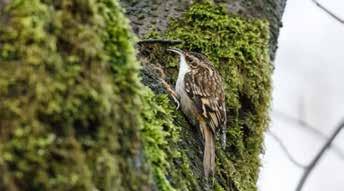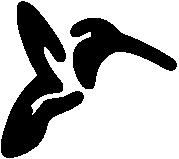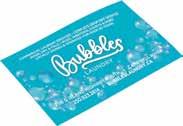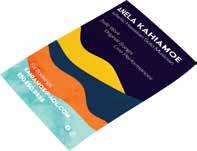
















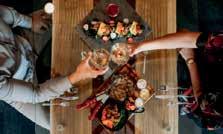
Put us in your plans and experience luxury in the lap of nature the Kwa'lilas way.

Kwa’lilas a traditional word meaning ‘ a place to sleep’ was chosen by the Gwa’sala ‘Nakwaxda’xw elders for this hotel, in hopes that travelers and guests would find peaceful rest here after a day of exploration in the North Island. After exploring, refresh with lunch or dinner from our Indigenous-inspired west coast menu in Ha’me’, our restaurant. Relax with an Island brew, glass of fine wine and tasty snacks in Nax’id’, our comfy, nautical-themed pub.

Located in downtown Port Hardy all our rooms host complimentary high-end amenities and services. You will find many expressions of our culture throughout our hotel and pub including masks and designs by local Indigenous artists. This is our way of sharing our history, our legends, and opening our hearts to welcome you to the North Island. The Kwa'lilas Hotel is located on the traditional territories of the Kwakiutl people and is a demonstration of the commitment of the Gwa'sala-'Nakwaxda'xw Nations to share our history, culture and passion for our traditional territory in a meaningful and permanent way by showcasing and celebrating it in a beautiful, comfortable space that is representative of the community.



6
8
12
14
18
20
24
28
WE ARE ART
Follow the Fiddlers!

Kristina Campbell
OCEAN CHRONICLES
Bill Maximick: Timeless Mariner History
Kealy Donaldson
WALKING IN THEIR FOOTSTEPS
The Coolest Band You've Never Heard of Dave Flawse
ARTIST FEATURE

Ernest Puglas | Kumainukw Wealthy One Kealy Donaldson
OFF THE BEATEN PATH
Mount Albert Edward Kealy Donaldson
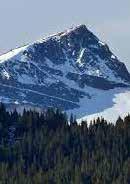
NORTHWEST COAST NATURE
The Challenges of Spraying for Spongy Moth
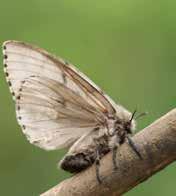
Luna Loiseau-Tremblay
WELLNESS ARTIST
Allan Vonkeman | The Coaching Circle
Kealy Donaldson
STAY WELL
The Arka Brotherhood
Kealy Donaldson
Sharing the Direction of Vancouver Island Communities 8 14 18 20
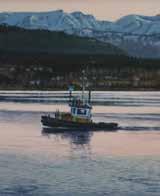
WWW.COMPASSMAGAZINE.CA

Emily Carr's monkey, a not-so-charming prince, and a world-renowned water diviner— come discover the Island's unexpected history.
vancouverislandhistory.com
There are times where is seems nothing is moving forward in life and there are times that we wish it would slow down. Life is a balancing act and if you are not happy with what your outcome looks like, you have opportunity to make change. Making changes to reset your life is possible and healthy for your mind, body and soul. Hitting that reset button may seem impossible. But if you can take it one step of the way, day by day, week by week, goal by goal, these steps can lead to some really big impactful changes in your life. Recognizing and acknowledging that you want to move in a new direction can be a big step all on its own. Try to embrace your goals daily and celebrate your wins, big and small, along the way! Make a new path, a new journey and embrace all that arrives to you and let the past go into the winds. A mind is like a parachute, it doesn’t work if it’s not open.”
– Frank ZappaKealy Donaldson
compassmagazine@ourmail.com www.compassmagazine.ca
PUBLISHER


Kealy Donaldson
CREATIVE DIRECTOR
Jessie Stones
The Compass Magazine is produced on Vancouver Island, printed on the West Coast of British Columbia and published on Vancouver Island paper by: Kiki's Communications Inc. ISSN# 2369-8063 101-1811 Comox Ave Comox, BC V9M 3L9 250.203.1880 compassmagazine@ourmail.com www.compassmagazine.ca



To Advertise & Subscribe
Kealy: 250.203.1880

In-Store Purchase $5
Back Issues $10
Annual Subscription $50 6 Issues






Follow the Fiddlers!
KRISTINA CAMPBELLFIDDLE REFERS TO THE type of music, rather than the instrument, and originates from traditional music genres such as folk, blues, country or Celtic. If you find yourself wanting to dance, it’s likely a fiddle! ‘Fiddling around’ has connotations of wasting time, but don’t mistake the informality of fiddlers for lack of skill. Skilled players find great joy bringing new players into the fold, sharing their love and enthusiasm with musicians of all abilities. Fiddle music, traditionally passed down from player to player and learned by ear, transforms through time. There isn’t a ‘right’ way to fiddle, and many talented fiddlers have never learned to read sheet music, learning entirely by ear.
Joyce Beaton and Craig Freeman are Vancouver Island fiddlers who formed, and continue to direct, two inclusive fiddling groups. Their passion for music and community is infectious!
Joyce Beaton started Oceanside Jammers in 2008. Home base is the Community Baptist Church, in Qualicum, BC. The Oceanside Jammers meet each Thursday, from 5-7 pm, and average about 20 participants per session. The first hour is focused on skill-building for novice players, while the second hour features challenging songs and faster tempos for experienced players.
The goal of the group is inclusion and fun. Attendance is by donation (suggested $30 per four-month season), and some instruments are available for loan. All instruments are welcome, including fiddle, cello, accordian, flute, harp, guitar and percussion. A few preliminary lessons are helpful for complete beginners, and members have been as young as five years old.

Joyce characterizes their typical playlist as Celtic, while acknowledging the vast reach: Irish, Scottish, Scandinavian, French, and Eastern Canadian songs are in their repertoire. Watch for the Celtic Chaos Winter Weekend on Quadra Island late March, a festival of sessions, classes, and performances, at the Harriet Bay Inn. Connect with Oceanside Jammers on Facebook to learn more.
Fiddle Jam
Make sure you have a bowel movement every day and taking a fiber, such as flaxmeal or psyllium, treats endotoxicity which are toxins created in the body in the bowel. Pectasol, a form of modified citrus pectin, has been studied to remove heavy metals. Colonics are also available (in Courtenay) if required and reduces endotoxicity.
Fiddle Jam members take the stage at Merville Hall Contra Dances throughout the year. February 25th is a Valentine’s themed dance, and St. Paddy provides the occasion on March 18th. Contra Dance originated right alongside fiddle music and is folk dancing which doesn’t require having a partner to join the fun! Contra dance welcomes the whole family for line, group, and partner dancing.

Saunas, either radiant heat or infrared, are effective at increasing the ability to sweat, eliminating toxins through the skin: the second kidney. Exercise also falls into this category. People such as hair dressers can smell chemicals exuding from their skin after sauna therapy.
If finding more fun is a priority in 2023, follow the fiddlers!
Craig Freeman is the father of multi-media artist and musician Trent Freeman. Fiddle Jam was created by Craig in 2000, when Trent was just 11, for musicians of all ages and experience to play and learn by ear from each other. Fiddle Jam meets every other week in the grotto of St. George’s United Church in Courtenay, BC, 7-9 pm.
Avoid non organic dirty dozen foods that contain the highest organophosphate neurotoxic pesticide residues according to the Environmental Working Group (EWG) ie peaches, bell peppers, apples, celery, nectarines, strawberries, cherries, grapes and lettuce.
Use air filters in the home to improve air quality. Don’t forget toxins come into the home on the furniture and other household items.
Don’t store food in plastics or microwave in plastics.
Craig remains the main organizer and suggests getting on the Fiddle Jam contact list by email at seabankmars@ shaw.ca to hear about jams and events. As group members introduce their favourite songs, Fiddle Jammers play all styles of music: traditional, country, reels, jigs, swing, jazz, dance and contemporary. Each session draws 15-20 players, and sometimes family generations attend together, just like the early days with Craig and Trent.
Greens in the form of cilantro, spirulina and green vegetables rich in chlorophyll can bind with toxins such as PCB’s for easier elimination, so add a “Greens Drink” to your daily routine. See “Clean, Green and Lean” by Dr. Crinnion.
Eat foods that help eliminate toxins: Cruciferous vegetables, resveratrol and quercitin foods (ie: blueberries, apples, onions, kale), celery, garlic, ginger, green, black, peppermint, rooibos and chamomile teas.
Use chemical free make up and skin care products: ie Lei Lani Makeup (Save On Foods) or Jane Iredale.
WIth over 40 shops, restaurants, banks and services, Discovery Harbour Shopping Centre is a convenient and relaxing place to stop, shop and dine on the North Island. Visit discoveryharbourcentre.com for a complete list of shops and services available at the Shopping Centre.


1416 Island Highway, Campbell River, BC, V9W 8C9 | discoveryharbourcentre.com




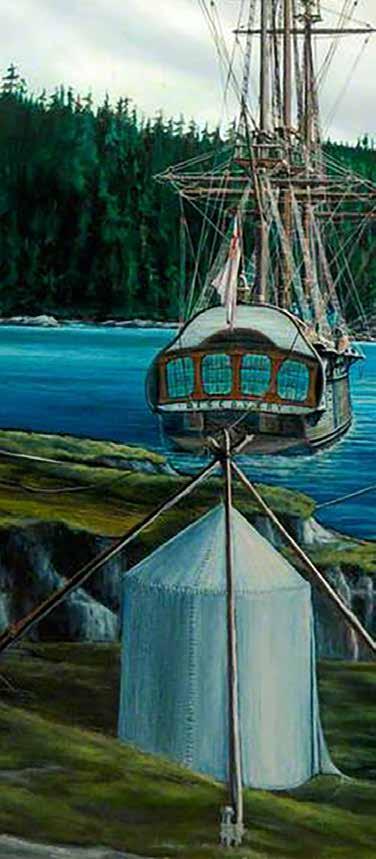
IT’S BEEN DECADES OF MARINE inspiration for Bill Maximick, through Vancouver Island history mixed with resource-based industries such as Fishing and Logging. As a Fine Artist, Maximick recalls an early start in his art journey. His sister, Teri, has a cookbook from his mother’s collection and on every vacant page are his drawings from when he was very young.
If you’re not familiar with Maximick’s work, you are in for a treat; his fine strokes and transitions are legendary, and recognized at a very high level. Maximick was recently awarded the SS Beaver Medal Award for Maritime Excellence—a prestigious medal awarded annually to up to four individuals for outstanding contributions to BC’s marine sector. Maximick was presented this medal award at CFB Esquimalt by Admiral John Anderson (Ret’d) in December 2022.

Sitting with Maximick, he has an easy style about him which feels familiar. He shares that he still has a charcoal drawing from when he was 14. Maximick used to sketch cars, now in the classic category, which would make him a little walking around money. At Edmonds Junior High, in Burnaby BC, Maximick had an Art Teacher, Jack Hardman, and he thought his teacher should be known and shown as a fine artist. When discussing with Hardman, the teacher noted that it is not an easy road as an artist.
Maximick was always asked to create backdrops for the theatre productions in high school, along with other art-based projects. “Probably the best influence for me was Mr. Hardman. He didn’t criticize and he encouraged and supported what was right,” he shares. “Some teachers point out the worst in your work, not the best. That makes it so difficult for those who are trying to learn and become better artists”.
Maximick has spent a lifetime on or by the water working in commercial fishing and tugboat transport. When he was 16 he got a job decking on a tug; when the summer was over he had made some really good money and decided to stay with it. Maximick took the high risk high paying work to raise his family and create stability while still dabbling in the world of Art.

It was in 1977 that Maximick had his first Art Show. He was looking for direction to go with his art. “When I was a faller in logging camps, I would work on my art in the evenings. I would get inundated with compliments from my co-workers. I decided I needed to have a show,” he reminisces. He began reaching out to Fine Art Galleries and connected with Bill and Rosland Bowie at 207 Government Street – Emily Carr’s House in Victoria. It was discussed and decided the gallery would host Maximick for his first show. He needed 30 pieces to have a proper show which is a big undertaking; he had a television interview that promoted this show and Maximick showed 13 of his pieces. As a result of the interview, he was offered his next show at Victoria’s Maritime Museum in 1978.
Then a letter arrived from Middlesbrough, England. The Captain Cook Museum wanted to host his work of Cook and Chief Maquinna at first contact, which historically happened on Nootka Island, located outside Gold River on the west coast of Vancouver Island. The piece is now part of the permanent collection there. Maximick was approached by the coveted Grosvenor Gallery in Vancouver; it turned out to be a solid relationship and he had 3 shows there. His piece ‘Swiftsure’ was featured in the gallery’s main window on Howe Street and of course sold, along with many other pieces.
Continuing his vision to show his work, it was in 1987 when he was juried and invited to participate in the Living Nature Show. Mila Mulroney’s Women’s Caucus invited him to jury submit for this special fundraising show. 57 pieces were chosen and two were his. Maximick and his wife Rena went back to Ottawa to attend Opening Night of the Living Nature Show – it was all black tie and the food was over the top. Many connections were made at that reception; one memorable connection was another artist Hugh Cunningham, who worked in bronze and marble. Cunningham told the Maximicks if they were ever in Montreal to visit his gallery. They made the detour and decided
to visit the gallery on South Sherbrook Street; it was an amazing time, Bill recalls. Meanwhile back at the Living Nature Show, his paintings were the first two to sell by sealed envelope bid.

The Maximicks had a gallery for many years in Comox on Nordin Street and then moved the gallery to Courtenay in February 2003. When COVID first started, the Maximicks closed their Courtenay gallery for the first three months and like most in business, they didn’t know what would happen. They gutted it out and made it through without taking any assistance.
With a slow restart their framing service started to pick up again, but they couldn’t host painting classes. Students have started to come back slowly and it’s beginning to pick up where they left off. Maximick has taught many the fine art of painting through the years.
When Maximick started commercial fishing with Kerry Frank, Geary Cranmer, an Artist from the K’omoks Nation, was fishing with Hereditary Chief Norman Frank. Cranmer decided he was going to try to paint and Maximick gave him a canvas at his old house on 5th Street in Courtenay. If you have seen Geary Cranmer’s work today, rest assured he is extremely talented, but like all good artists had some help along the way.



As Maximick continues to create and paint, he starts with his backgrounds until he is ready to dig into the finer body of his work. He continues to work away and currently is sketching the steamship, SS Beaver which sank at Prospect Point in 1888. “I always sketch using willow charcoal to start,” he shares.
When asked about his favourite subject matter, of course it is marine work, but also the locations that are special and close to home. He notes his piece ‘the Grappler’ when the settlers arrive in K’omoks and another period piece of Cumberland in 1908 with the Genge’s Milk Wagon going down the street in the snow. Maximick doesn’t paint to paint; he enjoys sharing the story of the piece.
He and Rena reside in Comox along with their pet bearded dragon, Charm, who is a Citrus Tiger. Their gallery in Courtenay, Maximick’s Originals, is open almost every day and he invites you to visit and adds, “It’s a great journey and it’s not over.”
ANY 50 YEAR ANNIVERSARY In the 1970s, Britain’s rising punk rock scene swept over the country’s rambunctious youth. Wildly popular bands like the Sex Pistols and the Clash performed for massive crowds and their influence spread to North America.
A world away in Saanich, BC, Jade Blade, Carmen “Scout” Michaud, and Dale Powers listened to their rambunctious records and soaked in the anti-establishment punk rock ethos. In 1977 the three highschoolers formed a band—the Dishrags were born.
The Dishrags were one of North America’s first all-female punk bands. In a music genre that was already obscure, they were an oddity in the male-dominated punk-rock scene. Jade Blade wailed on the guitar, Carmen “Scout” Michaud beat the drums, while Dale Powers slapped the bass. They all shared vocals.

Some audience members failed to appreciate the all-female trio and even threw beer bottles at the 14-
and 15-year-old teens. At some gigs, establishment owners wouldn’t want them to play on the venue drum kits or use the amps because they thought girls would break them.
But the punk scene was mostly positive. They played in what was considered to be Vancouver’s very first punk rock concert at the Japanese Hall. They would continue to perform in Vancouver the following year (while still attending high school) and in 1979 opened for a band they had only two years earlier admired from afar.
In January 1979 they opened for the Clash at the Commodore Ballroom. After that show the Clash invited them to open again at their next stop in Seattle.
The band began with covers then moved into writing their own songs and worked with Modern Records out of Seattle. They released two 3-track Eps: Past is Past in 1979, and Death in the Family in 1980.
The band disbanded in 1980 for reasons known only fully to the band members. Fast forward to 1997 and they re-released all of their original recordings in an album called Love/Hate.


In 2010 the old band got back together. The documen tary “Bloodied but Unbowed” spotlighted them, and in the same year they toured Japan with the Pointed Sticks.

Their legacy lives on in today’s rebellious punk youth. The group trailblazed for both the punk scene in BC and female punks. Today, women dressed in punk attire are sometimes referred to as dishrags.


Dave is the publisher of Vancouver Island History, a freelance writer, and an editor. He writes about history, but also other lesser-known, remarkable stories hiding in plain sight.



TO GO THROUGH RECOVERY and reset your life is not an easy journey. Whether you are addicted to eating, gaming, drugs or alcohol, it’s a very slow process that requires inspiration and goals. I met Ernest (Ernie) Puglas twenty some odd years ago and have watched the successes and challenges he has faced travelling this journey. He holds culture tight and it has helped lift him from dark times into the light of recovery and resetting his life.
From an early age, his mother, Lavern Henderson had him and his brother, Andrew, drawing every day using form line. Having family connection to the Henderson’s created huge
impacts, both artistically and culturally, that influenced his life and learning. Puglas recalls drawing a bear on a piece of yellow cedar, at the Numatsa Shed (the late Sam Henderson’s carving shed) and using his Uncle Billy’s knife to carve it. Lavern pulled the piece out recently, noting it as the first piece that he carved; he was 12 years old. “It’s in my blood for sure and I feel committed to sharing my knowledge and teaching others through the sharing of our culture” Puglas said “if it wasn’t for my brother pulling us out of darkness, I don’t think myself or Steph would be here now. I acknowledge all those who got us here and that it has taken family and love to get us to where we are today.”

Puglas has been living on Cortes Island for the last couple years with his wife, Steph Hanson, and they have both been working towards a cleaner living, focused through art and creation. He recently completed a totem pole for Klahoose Nation. Klahoose, which is Steph’s home nation, had been seeking a carver for the past 10 years. When Puglas reached out to a connection to inquire about this particular pole, he was told there was a project but a very small amount of money. So as part of his recovery journey, he took on the project for Klahoose, which features the story of the Salish Woman. Steph learned and practiced carving on the pole; they both supported the project and their recovery.
The project started in August and was complete early September of 2022 – 27 days total – till the raising of the pole in Squirrel Cove, in front of the Klahoose Nation Administration Office. This pole marks the first pole to be carved and raised since contact with historic adventurers. Many members gathered to honour the raising including some of Puglas’ closest family, Jonathan and Junior Henderson, his brother Andrew Puglas, his Mom and Dad and his son Hunter – they were surrounded by family and friends, including the Hanson’s. It was a great honour – they danced, sang and blessed the pole for Klahoose. He had been adopted into the Klahoose Nation, via Steph’s family. Being from Weiwaikum (Campbell River) as a Kwagiulth man and marrying a Salish woman – they feel the pole project was a binding of the marriage while honouring the Klahoose Nation. The pole will be in place till the end of its time. More opportunities are arriving now to teach and deliver more cultural projects for Klahoose.
Puglas recently completed a panel featuring two killer whales with gikame (chief’s mask) – 2 highest ranking chiefs from Mamalilikulla First Nation (Village Island), and the second highest in the potlatch system. There is now a beautiful sliding door 7’ x 4’ x 2.5” in the new Mamalilikulla Administration Office in Discovery Harbour, Campbell River. He carved the door on Cortes Island, taking about 3-4 weeks to complete as a solo carver.
Currently hosted at Spirit of West Coast Gallery, in the Comox Valley, is Puglas’ Sea Wolf Mask, which an important figure in their cultural Animal Kingdom. It features a moon on the top with sleeping eyes in memory of his late Uncle Mark Henderson, a very well known artist in his own right. It is accompanied by an Owl Mask, which is a messenger mask; there are many signs delivered by the Owl and Puglas truly felt the energy of the Owl Spirit when he was working on the mask. As we look at pictures and discuss some of our past friends
and family, Puglas shares he is ready for the next part of his journey “resurgence – relaunch and reset! Our dream is to have a bigger space for carving and teach generationally to share culture and knowledge.” We touch on some people who passed over now and one person who is very missed is Curtis Wilson. Wilson used to call him ‘Kuma’ and it stuck. It’s short for Kumainukw, meaning Wealthy One, Puglas’ traditional name which roots from the Wallas Kwaguilth.
Wilson’s friendship is missed by many and Puglas says it was a strong relationship, like brothers. A couple summers ago, he went back to the Numatsa Shed on John Henderson’s property at the Tyee Spit, Campbell River. He spent a lot of time creating pieces there and it started his journey of recovery.
The future looks promising with five children who can carry the legacy on that was started by Sam ‘Numatsa’ Henderson and many other famous family artists. Puglas continues to sing, dance, drum and create through culture. He will be heading out to Desolation Sounds late spring 2023, to Humphrey Lodge, to carve a 20’ totem pole. This pole will feature a warrior, serpent and an eagle topping this beautiful project. Then the following summer, 2024, Gorge Harbour Resort will be hosting him carving a special project there. Village Island is scheduled to be raising a Big House; there hasn’t been one since the potlatch ban in the 1920’s. Puglas will be one of the artists designing a pole. “Within a few years, the project will start. It appears that the location will be close to the existing poles that are still standing from many moons ago” he notes.
Through our conversation, Puglas says his message is strong “young people that struggle with trauma need to know there are other ways; we are a prime example of that. Don’t be afraid to reach out and ask for help”. They were against the odds and through their relationship with culture and love, they were able to find the path to recovery – what a journey it has been so far!
Connect with Ernie ‘Kuma’ Puglas at kumacreations86@gmail.comIf you struggle with trauma, don’t be afraid to reach out and ask for help.
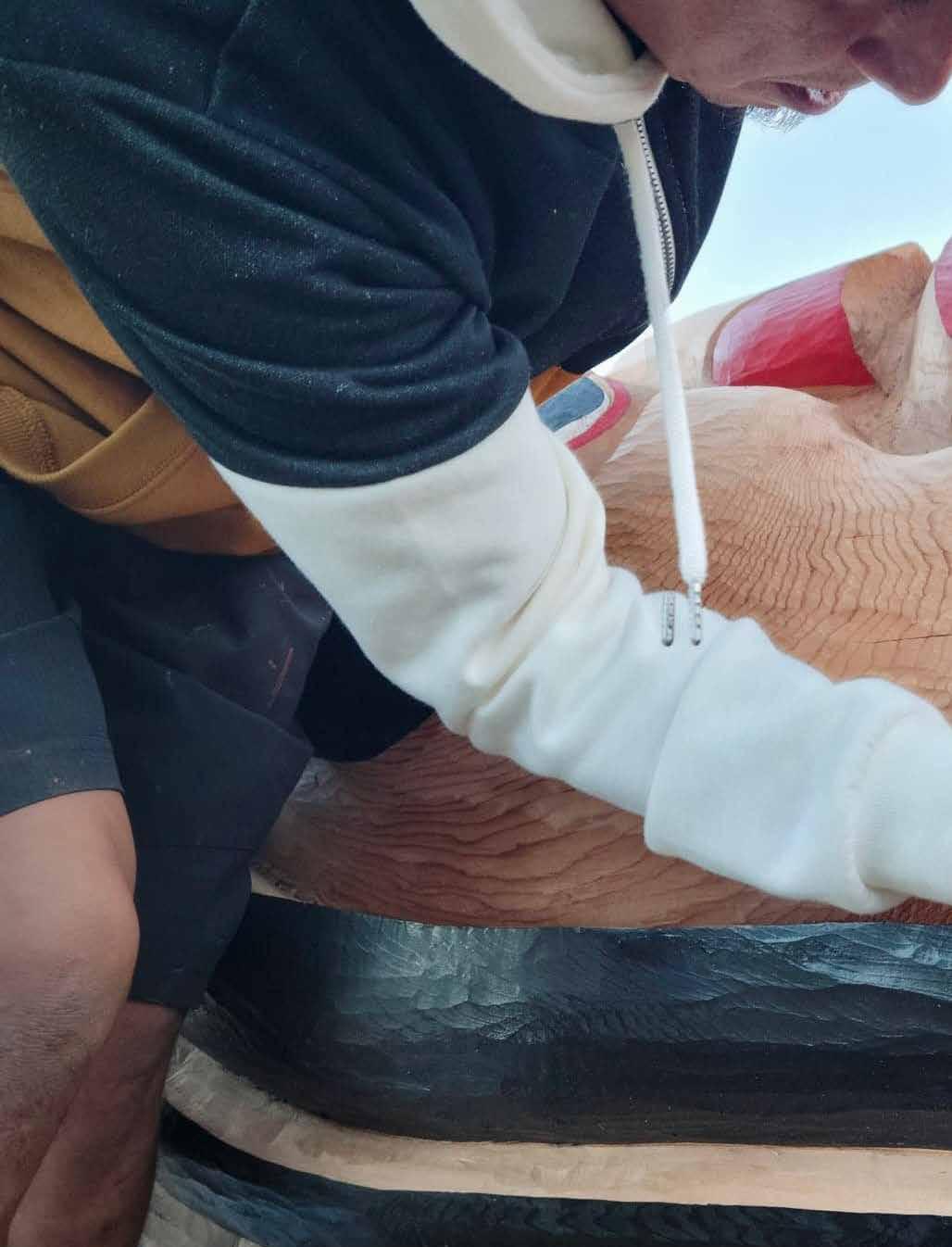
FEATURE ARTIST
ERNEST PUGLAS
Carving Totem
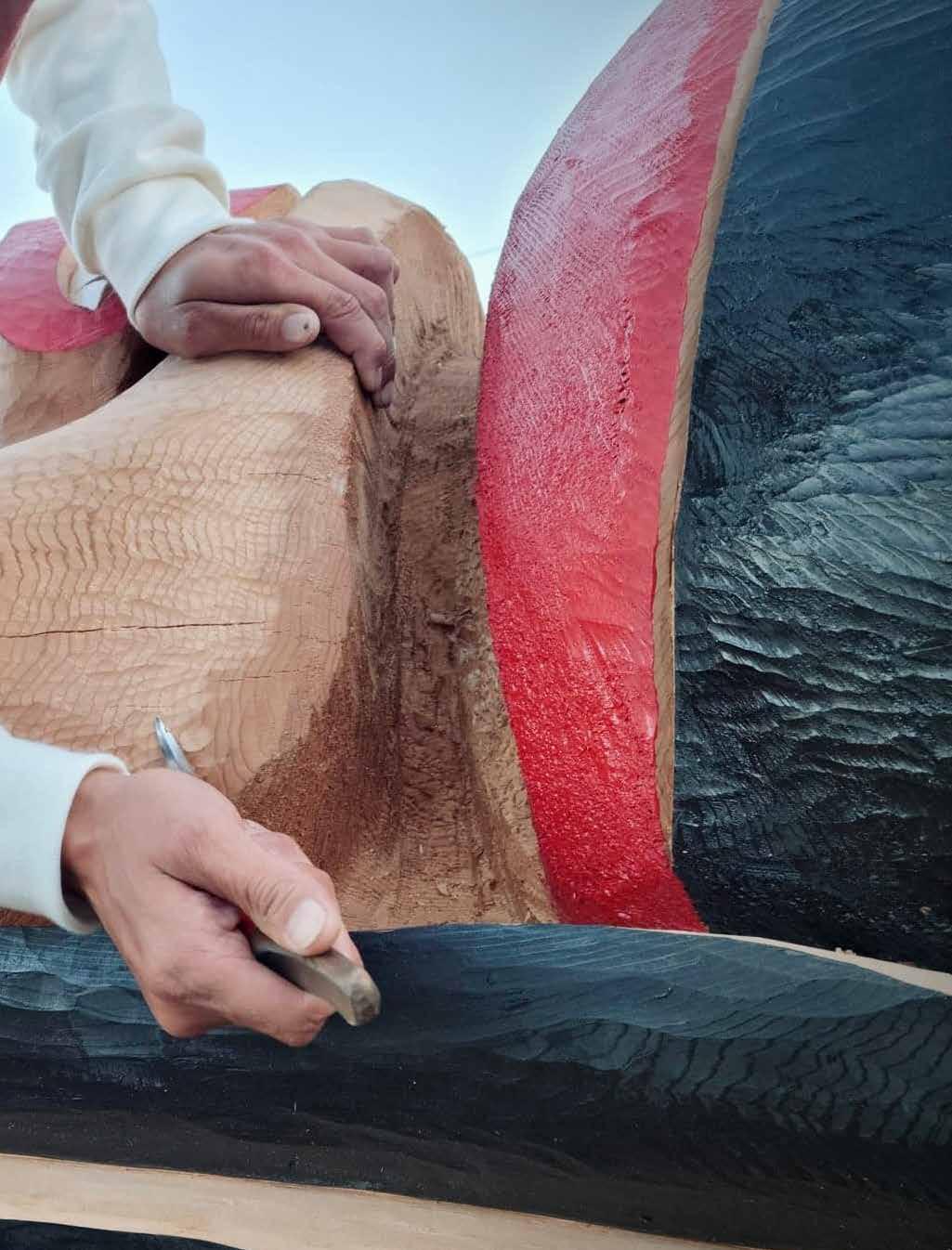

HOW MUCH MORE money, happiness, and fulfillment could you have within the next year—or even month—if you dropped the negative feelings, the fears, doubts, and insecurities that have held you back from what you really want? You might be getting in your own way; your own worst enemy.
But how do you break free from sabotaging yourself? Raising your own vibration can sometime feel like an impossible task—especially when you are feeling alone and fighting the world around you. But as humans, all of our cells communicate through light—this is being confirmed through bio-photonics. Light therapy can help your brain move into harmonic coherence, leading to lower stress, increased creativity, more frequent flow states and a feeling of wonder and awe. The Lucia N°03 uses wide spectrum solid light plus LED flashing at various frequencies to relax and dilate the central nervous
system. The brain moves from beta-dominance to alpha-theta—creating harmony.
Each session with the Lucia N°03 is a unique journey within. Colors, shapes and patterns dance behind closed eyelids; a kaleidoscope of light unfolds. Alongside this beautiful visual journey, the body begins to let go and deeply relax. Visionary journeys, healing memories and deeper understandings can emerge. The brain waves synchronize with the flickering light, creating coherence and ultimately finding its own harmonic expression. The Lucia N°03 grows with you: from resetting the nervous system and lowering the baseline levels of stress during intense periods, to opening the space for peak experiences, to inspiring creativity and compassion and even accessing flow states more regularly. Make this your year to break free of your low frequency and bring in your natural light and shine.



The Comox Valley Airport Commission is proud to sponsor the CV/Arts + YQQ Public Arts and Culture Program 2022-23, one of two annual shows of adjudicated work on public display at the terminal.
"Mindful Travel showcases artworks in a variety of media from artists across the region," says Jennifer Casey Executive Director of CV/Arts. "We are thrilled to continue the longstanding partnership between Comox Valley Arts and the Comox Valley Airport Commission and are delighted to promote the illustrious breadth of local artists here in the Comox Valley."
"We live in one of the most beautiful regions of the world but are reminded of its fragility and our responsibility for stewardship", says Comox Valley Airport's CEO, Mike Atkins. "Global tourism has great economic benefits but comes with the duty to manage it responsibly and sustainably. The team at CV/Arts has done a wonderful job in curating this collection, echoing sentiments attributed to Chief Seattle over one hundred years ago - Take nothing but memories, leave only footprints, through modern artist's eyes."
The exhibit runs until mid-April. Most works are available for sale by contacting CV/Arts or via the artist directly.

 LUNA LOISEAU-TREMBLAY
LUNA LOISEAU-TREMBLAY
AS THE GRAY DAYS OF JANUARY start to lighten up, and the shades of green and browns deepen with the dampness of the season, a closer look shows that there are signs of spring all around us. While the winter months feel long and dark, before we know it there will be wildflowers popping up and pollinators flying around doing their business.
As most of us are well aware, habitat loss is the number one concern impacting biodiversity around the globe, the ravages of which are seen and felt in almost every ecosystem on the planet. The mention of invasive species is common—with many folks discussing scotch broom or himalayan blackberry—but it is important to keep in mind that the onslaught of introduced species is the second biggest issue regarding loss of native biodiversity on a global level. In this area, species such as knotweed, broom and invasive blackberry are commonly associated with this issue but there are
many introduced species of concern that should also be considered.
One of these species is the Spongy moth (formally the gypsy moth) Lymantria dispar dispar, an introduced member of the moth subfamily Lymantriinae, the tussock moths. The Spongy moth is native to Europe, North Africa and Asia but is now found in North and South America. This particular insect is responsible for a large amount of damage to a variety of hard and softwood tree species in Canada, including species of Oak, Maple, Alder, Birch, Hawthorne and fruit trees.
The Spongy moth inflicts the most damage during the caterpillar stage, the part of its life cycle in which it is known to completely defoliate host trees. The defoliation of its canopy can impact a tree’s growth and reproduction, making it more susceptible to other parasites and diseases. Economically, this impacts the aesthet-
ic of the forest, which stretches into ecotourism. In urban and residential areas, poor tree health results in tree removal or replacement—with negative consequences on the property value of the affected areas. Ecologically, the defoliation of a canopy heavily impacts tree species composition and other wildlife species that use these trees, since poor tree health can affect forest dynamics through the lessening of available habitat and decreased food production. Spongy moth caterpillars can outcompete other species of Lepidoptera (moths and butterflies) or do enough damage to an ecosystem that it is difficult to support other insect species.
The BC government has been monitoring the Spongy Moth for years and while different control measures have been used to treat affected areas, the main method on Vancouver Island and surrounding areas is the aerial spraying of Btk, or Bacillus thuringiensis var. kurstaki, a species of bacterium used as a biological pesticide against pest caterpillars. In order for Btk to work on the target species, it must be administered so that the moth caterpillar will ingest the pesticide through the eating of foliage. Btk is lethal to caterpillars in the order Lepidoptera, which includes all butterflies and

moths. However, according to the BC government, Btk is not toxic to any non-target species and their website states that “Btk has no known toxic effects on humans, other mammals, plants, birds, fish, or honeybees or other beneficial insects”.
While this may or may not be true, several points should be made. Stating that non-target species are not impacted is misleading, as Btk is lethal to all species of moths and butterflies. Their life cycle follows the same life cycle as that of the Spongy moth, so any caterpillars of any other species in the area that is subjected to aerial spray are also doomed to being reduced in numbers. In addition, amphibians are extremely sensitive to any toxins in the ecosystem, and it is unclear what the impact of Btk is on this group of organisms. While information referencing Btk as a biological control agent states that it is nontoxic to beneficial insects such as ladybugs and bees, it is clear that more studies need to be done to ensure that is actually the case.
The BC government does emphasize that while it isn’t toxic to humans, anything that has been exposed to spray should be washed thoroughly, including garden produce. Windows should be closed and Btk should


not be inhaled within an hour or more of being sprayed in an area. Btk is sprayed between April and June, but is most effective during the spring, which is when non-target pollinators (including butterflies) be come abundant. While the pesticide does not appar ently impact butterflies and moths in the adult (flying stage), pupae, or chrysalis stage, spring is when most species are in the caterpillar stage of their life cycle, thus being the most susceptible to the effects of Btk, while foraging for food.
Understandably, there is not enough space in this ar ticle to get into an in-depth discussion regarding this issue, however several perspectives should be consid ered with regards to the use of Btk as a biological pes ticide. A field assessment in 2003 was done to see how much impact spongy moth eradication control mea sures had on non-target lepidoptera species and it was discussed that non-target butterflies and moth abun dance was significantly reduced, along with non-target and target (spongy moth) species, over several years after the spray.
Other studies have pointed out that while there are clearly concerns around non-target species of butter flies and moths, the decision not to spray may result in worse impacts. While this could be true, much of this also depends on other factors that contribute to how bad Spongy moth outbreaks are in different areas. As the BC government website points out, this species often attaches its egg masses to outdoor household ob jects, wood or anything transported in a vehicle, mak ing it very easy for it to spread.
According to the Ministry of Forests of BC, the 2022 season for monitoring Spongy moths trapped a record amount in the province. Because of this, treatment for Spongy Moth will be done from April to June 2023 and will cover Victoria, Courtenay, Campbell River, and Port Alberni. According to the Ministry website, the biological insecticide used will be Foray48B, which contains the active ingredient Bacillus thuringiensis var. Kurstaki (Btk). I would strongly encourage anyone who is interested to learn more to visit the BC government website—easily found through www2.gov.bc.ca—and search 'invasive forest pests and pathogens'. Residents within spray zones are invited to submit comments before February 21.
More information can be found here:
https://news.gov.bc.ca/releases/2023FOR0001-000018

ALLAN VONKEMAN IS A SPIRITUAL seeker with feet planted firmly on the earth. With 40 years of experience working in policing, critical incident management, community engagement, not-for-profit leadership, and investigations, his experience has given him the ability to stand in the chaos seeing the larger picture, asking the right question to discover the way forward.

“I always felt like a spiritual seeker, yearning for connection with the Creation and with other people. This tendency to connect didn’t stop me from falling asleep to my true nature, damming up my emotions while attempting to become part of something ‘bigger’, and losing the ability to inhabit myself, failing to develop a strong sense of my own identity,” Allan says. “At a very young age, I became the ‘good Christian boy’ but essentially I was living in a state of false spiritual attainment. As an adult, I merged with the police force believing that the ideals it held high were my own.”
Allan ignored the more disturbing aspects of life, trying to seek some degree of peace, comfort and belong-
ing. In pursuing this level of connection while ignoring reality, he became disillusioned and resentful and was saying yes to things he really wanted to say no to. Then questions began to arise: “Is there only one way to God?”; “Is justice really fair and available to all?” Allan went through life trying to be of service, to create peace while wearing a suit of armour to protect himself against the world. Not wanting to confront the paradoxes and tensions in his life, he avoided what he perceived as conflict – in himself and in life.
Allan learned that saying no and setting boundaries has less consequence than saying yes. “Avoidance does not lead to relaxation, and losing connection to my true nature left me without a sense of my own identity," he says. "The truth is, my presence, opinions, and involvement matter. I have to value myself and believe this first, in order to be of service to myself and others."
He says that his big AHA was when he realized he can be in service to the Greater Good more powerfully if he is connected to his own sense of self.
“In coaching, my intention is to co-create sacred space where honest, authentic conversation sparks remem bering and transformation," he says. His coaching goal is to create safe spaces for profound and transformation al conversations, using the tools of deep listening, cre ativity, ceremony, and intention where clients can ho listically explore their emotions, obstacles, challenges, discover their passions and action their dreams. Joseph Campbell once said, ‘The treasure you seek is in the cave you fear to enter.’ Vonkeman believes that through a coaching partnership, a torch can be lit, illuminating that entrance to the cave of treasure. That treasure is
Have you ever felt disconnected? Lost? Resentful be cause you’ve said yes instead of no? Really yearning for connection: with yourself, people, the universe/ God, something? If so, you not alone! Allan was drawn to coaching because of the ability to connect with the people where they are right now and support them in il luminating their own path forward – a path forged with their values, purpose, and passion.
The joys and privileges of life’s journey are the oppor tunities to learn, to grow and experience; then to share these gifts and tools in coaching. From Shamanic cere monies and mystic retreats to the Wisdom learned from Elders and experts in Indigenous ways of being, coach ing, psychology and spirituality—these are all treasures to be shared in this moment.
Allan hosts astrological readings in the Comox Valley, adding another way to regain an understanding of our connection to universe. Astrology provides a compass, or more correctly a Sextant, as we travel toward heal ing and purpose. It connects Father Sky (heaven) and Mother Earth allowing a reconnection to an Indige nous way of being that is at the core of all of us. The celestial signs are linked back to the four elements of Earth, Water, Fire and Air. Each person’s chart reflects their elemental makeup and its balance or imbalance. In this way it also reflects the Medicine Wheel, our con nection to our physical body, emotions, mental being and spiritual connection. In short, Astrology helps us in exploring answers to questions such as Why am I here? Why do I behave in the ways I do? How can I be more compassionate to myself?
Interested in exploring a more holistic client centered and ceremonial approach to sparking your life?



Connect with Allan Vonkeman
www.thecoachingcircle.ca | allan@thecoachingcircle.ca
MOUNT ALBERT EDWARD is pretty close to a 40 km loop trail in the Comox Valley. Generally considered a challenging route, Mount Albert Edward is the sixth highest peak on Vancouver Island, and one of the only trails directly to the summit of a major peak. This loop takes an average of three days to complete, and is a very popular area for backpacking, camping, and cross-country skiing. You'll likely encounter other people while exploring as the loop is popular and used all year round. The most optimal time to visit this trail is April through October and you can bring your dogs but must be leashed.
Although this trail starts in close proximity to Courtenay, it’s important to remember that you venture deep into the backcountry and up into the exposed alpine. This trail does see a high number of easily avoidable injuries and search and rescue incidents each year.
From the trailhead to Circlet Lake, the trail is well maintained and very easy to use. While weather conditions at the higher elevations vary almost all year, it is important to know what to expect before arriving, so hikers can check Mount Washington's Nordic cameras to gauge the snow levels at weather before hiking in.
While this can be a great challenging single day hike, most like to spread out the adventure divide their hike into three days. It’s highly recommended to spend day one as a nice and easy hike into Circlet Lake where the campsites and facilities are kept in excellent shape.
The second day consists of hiking from the campsite to summit Albert Edward, which is a good uphill climb that is nicer to tackle slowly, over a full day. This is a great part of the multi-day hike, since the views are gorgeous. After you breach the climb, there is

not much for shade, but the upper tundra is not very challenging until the final climb. Views are all around, sweeping views of the area, and even the ocean.
Then, for the final day, plan on spending some time on another easy hike out around the other way. It’s very scenic with the meadows and various lakes. Weather can sometimes be unpredictable here, so if you pass the Forbidden Plateau Ranger's Cabin and the weath er changes, hikers recommend trying to spend a night at Kwai Lake instead and then summit later when the weather is better.

On summer weekends, expect all the pads to be oc cupied, so do your best to find a grassy area to lay out tents. Some people even bring their fishing gear, since you can fish trout in the lakes.

Pie Factor y Amazing Pies

NOW Available at Compass Galler y + Gif ts!
101-1811 Comox Ave
Monday - Saturday 10 - 5

It ʼs ISL AND GOOD!
Pic k up your f avour ite piefrozen! Pre-orders welcome! pief actor yorder@our mail.com
MENU
Lunc h & Dinner T ime 10" / 6"

Roasted Chicken Pot Pie $26 / $13
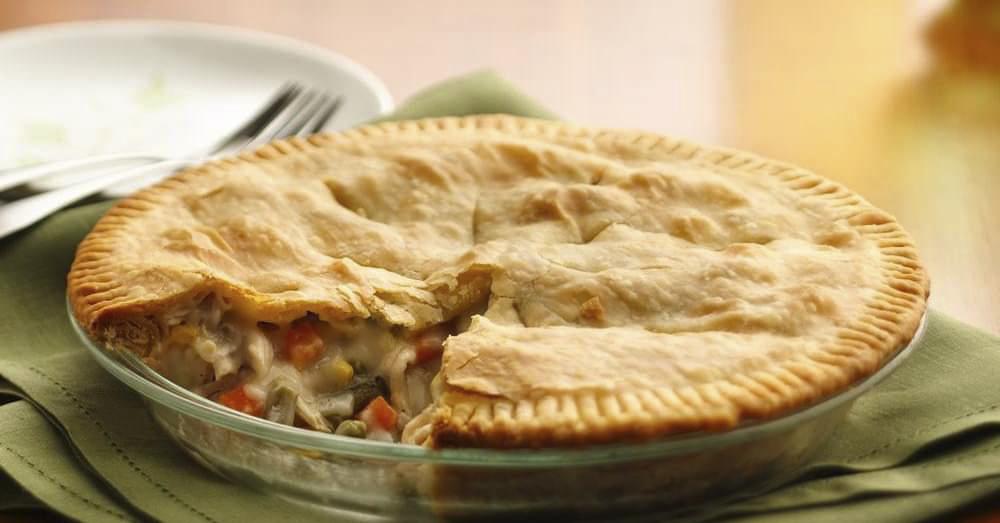

Traditional Tour tiere $26 / $13
Pulled Pork + Mushroom Pie $26 / $13
Coming soon ... Spinach+Feta & Roast Beef!
Pie Any T ime
Sweet Peach Pie $22 / $11
Grandma’s Apple Cinnamon $22 / $11
Best Berr y Pie $22 / $11
Ot her Treats @ t he Galler y
Individual Gluten Free + Vegan
Sweet Bakery Treats $6
Daily Tilly's Soup + Scone $7
Soup $5 Hot $4 Frozen
Gluten Free + non-gmo
Scone $3
Pecan or But ter Tar ts $3/$15 for 6
DURING THE PERIOD when the world shutdown, I became more aware of the seriousness of mental health issues and self-worth. Through dialogues with friends and communities, it became apparent that there were few offerings directly supporting men’s mental health issues. I saw more and more male friends struggling and stuck in the old fashioned pressure to "be a man" and ignore their feelings. Recently, I have had the opportunity to support some friends, and help them find their way back to a path leading them forward in life.
Recently, Paul walked through the doors of Compass Gallery and we had a wonderful chat about a new chapter of ARKA that is being launched in the Comox Valley. This organization is a strong resource for support and personal growth.
The Arka Brotherhood builds better men through leadership training. The Brotherhood provides a structured space for men to transform themselves into self-aware, self-disciplined, empowered and

leaders. Each leader is mentored by fellow squad captains, senior leadership and the Arka founder.
Members meet weekly in small circles, in-person or online, called ‘Squads’. Each squad is led by an experienced leader that referred to as ‘Captain’. The focus of the meetings is on speaking the truth, listening deeply, and mutual support. Men join to overcome self-sabotage, be challenged, be celebrated, set goals and be accountable for them. “ARKA” represents growth, solar energy and unification of the four masculine archetypes; King, Warrior, Magician, Lover.
The Arka Brotherhood has some deep roots. Originally called “the Samurai Brotherhood”, it had its genesis in Phil T. Mistleberger’s involvement in a weekend men’s workshop in early 1992. This workshop lasted 48 hours and involved over 200 men stuffed into a gymnasium. The seminar had been run by Justin Sterling, founder of the Sterling Institute of Relationship and its men’s arm, called the Men’s Division.
In March of 2015 Mistleberger launched the latest reboot, beginning with just six men. As of early 2022, the organization has grown to close to 500 men and dozens and dozens of squads. Two things stand out about this upgraded version of the brotherhood: the age, and the enthusiasm of the participants. Previous iterations of the community averaged about 40 years of age. The current average age is between 25 and 40. There are older men but the relative youth of this brotherhood is one of its strengths.

The growth of the brotherhood demanded certain changes in the group structure. In early 2016 the organization broke up the initial large group and began to divide into separate groups, which are now called “squads”. Squads are led by captains and lieutenants, senior members of the brotherhood.
In late 2021, the brotherhood went through a rebranding process, and the name was changed from Samurai Brotherhood to Arka Brotherhood. The executive leaders of Arka Brotherhood are Nick Solaczek and Ben Goresky, assisted by a capable group of division commanders.
Men in our modern society—especially younger men—need in their lives the sort of quality men thebrotherhood has. The unique makeup of the community, along with the overarching framework of the 14-Point Code of the Conscious Warrior that Mistleberger spent decades formulating and refining, makes it a ripe ground for growing excellent, quality, strong men.
ARKA circles and retreats operate within 14 guiding principles designed by founder Phil T. Mistleberger. The code is grounded in his 30+ years of experience as a student and practitioner of numerous Eastern and Western transpersonal traditions as well as his deep and broad knowledge of psychology, historical warrior cultures and wisdom teachings.

A code of conduct reflecting the values of the brotherhood and provides a solid foundation to live by. Every member is expected to aspire to, adhere to, and uphold the values contained in this 14-point code.


1. Make your word good
2. Know yourself
3. Train your body
4. Find the holy grail, your true calling
5. Do not fight down
6. Gather courage and move forward
7. Hold space
8. Be passionate and compassionate

9. Learn, study, trail
10. Serve a noble cause greater than yourself
11. Penetrate life with your solar energy
12. Be in integrity
13. Stay in relationship
14. Be a responsible son, parent, grandparent, brother, uncle, husband, boyfriend, grandson, cousin, brother-in-law
Connect with Paul to attend the next Comox Valley ARKA Brotherhood meeting and learn more 236-508-8827 | www.arkabrotherhood.com


As the end of January approaches, cold sunny days, sprouting crocuses and snowdrops push their leaves through the ground, reminding us that warmer days are ahead. The middle of the winter can feel lackluster but indulging in outdoor pastimes can help with the January blues. Regardless of how much of a beginner one is, birdwatching is an interesting and fun way to interact with nature, giving a sense of accomplishment at any age in knowing how to name common bird species.
One of my favorite songbirds to see is the lovely little Brown Creeper, Certhia americana, a member of the family Certhiidae, the tree creepers. This bird species is small, weighing under 10 grams with white underparts and light spotting on the upper part of its body. Its tail is stiff and pointed, helping it with balance as it scampers and spirals up a tree looking for insects. Brown creepers have a long thin bill that is curved slightly downward. The light spotting on the upper part of its body makes the brown creeper incredibly camouflage against tree trunks and helps it avoid predators such as house cats, raccoons and birds
of prey. When faced with danger, it flattens its body against the tree and blends in perfectly with the natural shades of gray, white and brown.
This colouration also distinguishes the species from smaller birds that it could be mistaken for, such as the Red-Breasted Nuthatch or the Golden Crowned and Ruby Crowned Kinglets.
At this time of the year, these little birds can be seen alone, flying to the bottom of a tree and running up the trunk in short, jerky bursts of movement, in a spiral fashion, then doing the same on branches all the while probing the bark quickly with their beaks. Brown creepers feed primarily on invertebrates that live in the bark of their preferred foraging choices which are mostly large conifers. The deeply furrowed trunk of large diameter douglas fir or scaly bark of a big old spruce tree, presents a perfect opportunity to probe and peck for a wide variety of spiders, weevils, beetles, larvae and many other species of forest dwelling arthropod.
While brown creepers are a common songbird to see in this area and with their preference of mature, damp mixed forests, they are at risk of habitat loss. There are many species of plants and animals that rely on mature forests and the ecological dynamics present in those habitats.
Clear cutting and selective logging, particularly of conifers, takes away mature tree stands that are the preferred foraging for these birds while the dead and dying trees, which are the areas that brown creepers prefer to nest in, are removed by wood salvaging practices or safety concerns. Appreciating and understanding the relationships between the organisms within our treasured coastal rainforest ecosystem is more important than ever.
